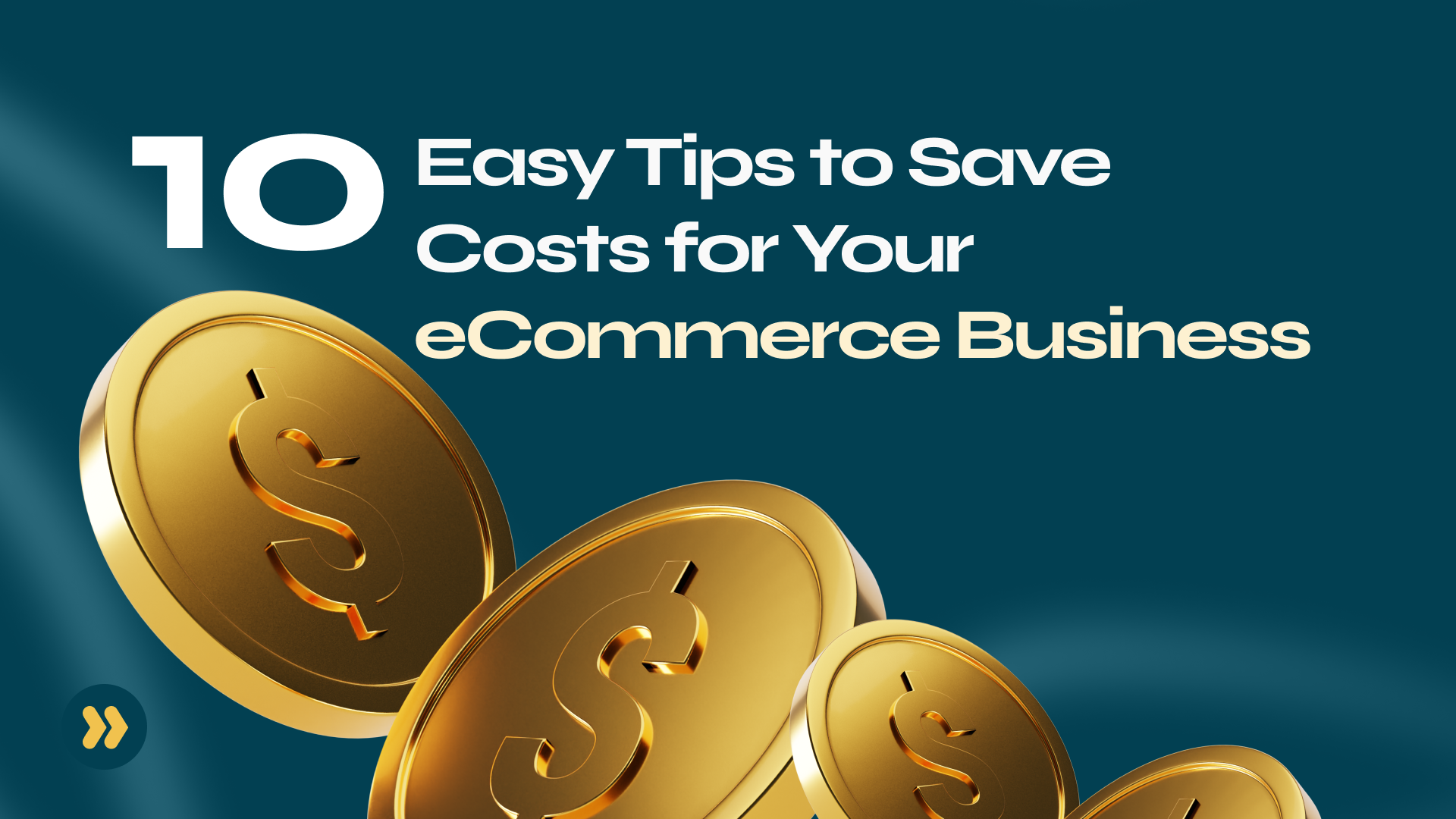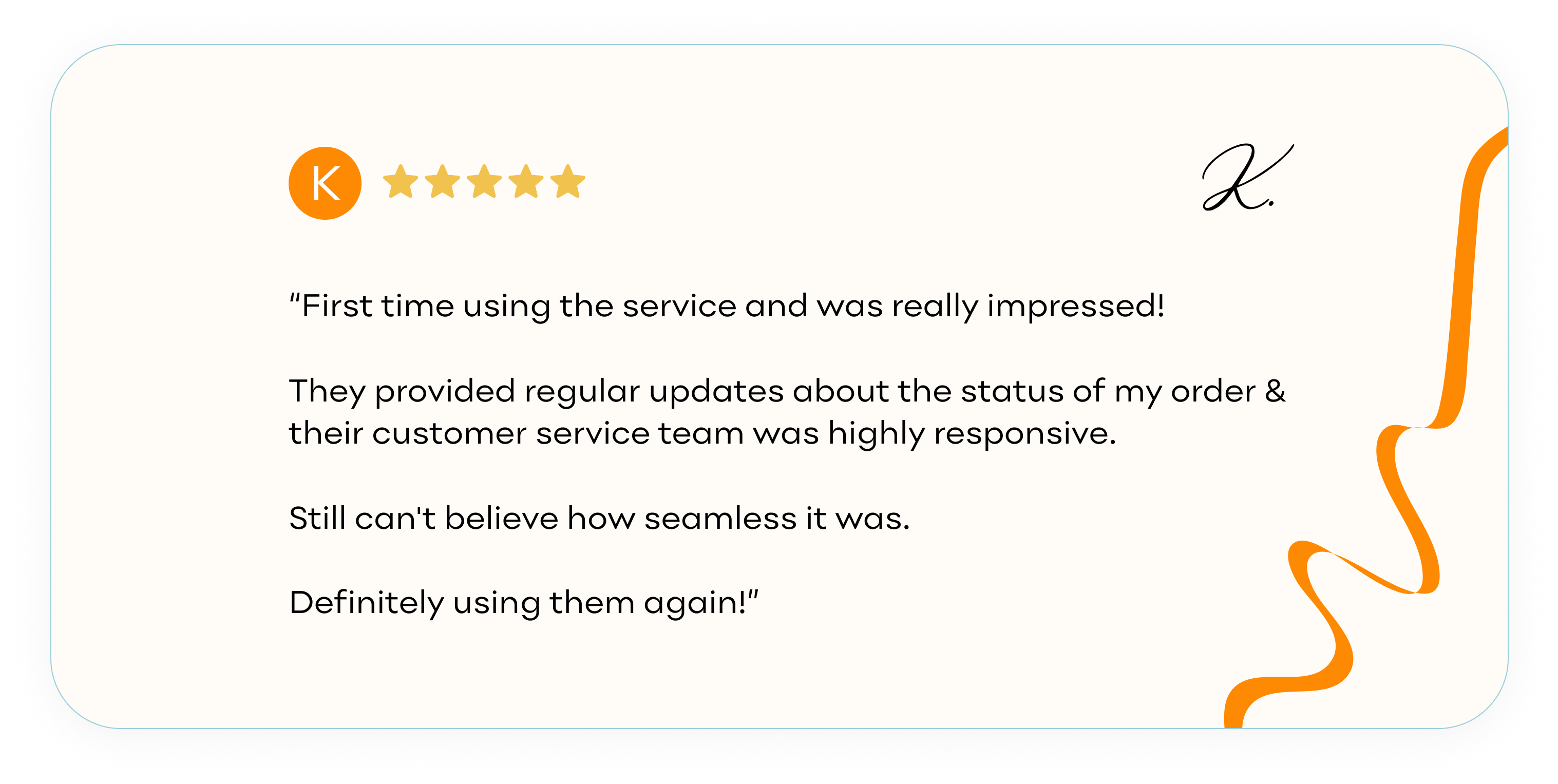10 Easy Tips to Save Costs for Your eCommerce Business

Some weeks ago, I got a call from my cousin (let’s call her Oreva) running an online store, and she said, “My business has been stressful. Logistics issues and trying to get this shop set up are draining all my money, and I’m thinking of taking a break after this phase.”
Now, let's be honest - who hasn't felt that kind of pressure in eCommerce? It's like trying to tame a whirlwind. Oreva’s story isn't just hers; it's an anthem sung by entrepreneurs, especially those in the digital marketplace.
In my bid to be the solution-providing cousin, I spoke extensively to her about things she could do to reduce costs while keeping the business profitable. This blog will cover the tips I shared with my cousin. We will share down-to-earth tips that make sure your hard-earned cash is in your pocket and not down the drain.
Ready? Let's go!
Conduct a Comprehensive Cost Audit
“When leaving the house, do you just jump into your car and start driving?” I asked Oreva.
“Ah, no o. How will I know if my fuel will be enough to take me there? And I like always to be ready.” she replied.
Driving a car without knowing how much fuel you have left keeps you on the edge, as you never know when you’ll run out of fuel. Similarly, running your eCommerce business without clearly knowing how much your expenses run into can cause financial anxiety.
Knowing the state of your business's expenses is one of the first steps to its financial stability. It helps you see how your money is spent, uncovering potential leakages.
To conduct a cost audit, you should first analyse your fixed costs. Fixed costs are the steady, unchanging expenses that keep your business running, regardless of sales—rent, utilities, and salary fall under this category. Review your financial statements or expense tracker to see areas where you can cut costs without affecting operations.
Next, you have to evaluate variable costs. Variable cost is the opposite of fixed cost, fluctuating with the business activity. Things like shipping, marketing, and even packaging fall under this category. Still, you have to review your financial statements to identify areas where you can cut on these costs without sacrificing quality or customer satisfaction.
You also have to identify optional spending. These are expenses that do not align with your business goals. It could be subscribing to too much marketing software or even an oversized office space, in the case of my cousin. When it's time to make spending like this, ask yourself if it's essential for your business's success.
Negotiate with Suppliers
To save costs while running a successful eCommerce business, you must hack negotiation, such as negotiating with suppliers. A mutually beneficial relationship with your suppliers can help you save cost, improve the quality of the products you sell, improve your revenue, boost profit and even solidify business relationships.
The first step to successful supplier negotiation is understanding the supplier's business and market. With this, you'll know if you fit in that market and if the supplier is about for your own needs. When you find a supplier that fits your needs, be clear about your expectations and do not hesitate to ask for what you need.
Another key to successfully negotiating with your suppliers is establishing a long-term relationship. This enables trust building and collaborative working to get the quality you need and to identify and sort out potential issues.
Consider Outsourcing Non-Core Activities
One of the most important things I have learned is that "you can't do it all by yourself." And this is where outsourcing comes in. To outsource is to hire a third party to handle activities you or your in-house team would have handled.
Outsourcing can be a great way to streamline your business operations, reduce costs and boost efficiency. So, before you outsource, several factors must have been thoroughly reviewed.
Firstly, you'll have to identify tasks that don't fall within your business's core focus. Non-core activities are those tasks that do not directly relate to your business's big picture, goals or unique value proposition.
For example, IT support, payment systems or even bookkeeping may not be your most robust suite, but they are needed for your ecommerce business to thrive. So what do you do? Outsource.
After identifying your non-core activities, the next thing you need to do is evaluate the cost-effectiveness of outsourcing. Does it make sense financially to outsource? Or do you continue handling in-house? It is important to note that with the right partner, you'll enjoy specialised expertise, reduced costs and even the needed help to scale your business operations.
Finally, you'll have to choose a partner. Your outsourcing partner is more like a business partner and must be adequately vetted to ensure that they provide high-quality service. Do your due diligence, research, ask deep questions, check records, client testimonials and industry reputation. Ask for referrals and do interviews to make sure their expertise aligns with your needs.
Opt for Digital Marketing
If you go to Instagram or Facebook, you must have seen ads from people selling things before you take five scrolls. The digital age has closed most barriers to marketing, and businesses can now reach their target audience easily, quickly and with lower costs.
Digital marketing is how most eCommerce businesses provide a range of channels (online ads, social media marketing, SEO, email marketing, etc.) to reach your potential customers without breaking the bank.
Compared to traditional marketing, digital marketing is more cost-effective, and the chances of reaching your desired audience are very high. This is because different channels can be explored. Facebook, Instagram, X, Some weeks ago, I got a call from my cousin- Oreva running an online store, and she said, “My business has been stressful. Logistics issues and trying to get this shop set up are draining all my money. I’m thinking of taking a break after this phase.”
Now, let's be honest - who hasn't felt that kind of pressure in eCommerce? It's like trying to tame a whirlwind. Oreva’s story is common to entrepreneurs, especially those in the digital marketplace.
I spoke about things she could do to reduce costs and still keep the business profitable. This provided a solution to her problem.
This blog will cover some of the tips I shared with my cousin. We will share down-to-earth tips that make sure your hard-earned cash is in your pocket and not down the drain.
Ready? Let's go!
Conduct a Comprehensive Cost Audit
“When leaving the house, do you jump into your car and start driving?” I asked Oreva. “Ah, no o. How will I know if my fuel will be enough to take me there? And I like always to be ready.” she replied.
Driving a car without knowing how much fuel you have left keeps you on the edge, as you never know when you’ll run out of fuel. Running your e-commerce business without knowing your expenses can cause financial anxiety.
Knowing your business's expenses is one of the first steps to its financial stability. It helps you see how your money was spent, uncovering potential leakages.
To conduct a cost audit, you should first analyse your fixed costs. Fixed costs are steady, unchanging expenses that keep your business running. These expenses occur regardless of sales. Rent, utilities, and salary fall under this category. Review your financial statements or expense tracker. See areas where you can cut costs without affecting operations.
Next, you have to check variable costs. Variable cost is the opposite of fixed cost, fluctuating with the business activity. Things like shipping, marketing, and even packaging fall under this category. You also have to review your financial statements to identify areas where you can cut on these costs.
You also have to identify optional spending. These are expenses that do not align with your business goals. It could be subscribing to a marketing software you don't use. It could also be an oversized office space, in the case of my cousin. When deciding on optional spending, ask yourself: "Is it essential for my business's success?"
Negotiate with Suppliers
To save costs while running an eCommerce business, you must negotiate with suppliers. This involves finding ways to spend less. Building a good relationship with suppliers can help you save costs and improve product quality. It can also boost revenue and profit and solidify business relationships.
The first step to successful supplier negotiation is to understand the supplier's business and market. With this, you'll know if you fit in that market and if the supplier is about for your own needs. When you find a supplier that fits your needs, be clear about your expectations. Do not hesitate to ask for what you need.
Another key to successfully negotiating with your suppliers is establishing a long-term relationship. This enables trust building and collaborative working to get the quality you need. It also helps you to identify and sort out potential issues.
Consider Outsourcing Non-Core Activities
One of the most important things I have learned is that "you can't do it all by yourself." And this is where outsourcing comes in. To outsource is to hire a third party to handle activities you or your in-house team would have handled.
Outsourcing can be a great way to streamline your business operations. It can also reduce costs and boost efficiency. So, before you outsource, several factors must have been reviewed.
First, you'll have to identify tasks that don't fall within your business's core focus. Non-core activities do not relate to your business's goals or unique value proposition. For example, IT support, payment systems or even bookkeeping. You may not have a lot of strengths in these areas, but they are needed for your e-commerce business to thrive. So what do you do? Outsource.
After identifying your non-core activities, the next step is to check the cost-effectiveness of outsourcing. Does it make sense financially to outsource? Or do you continue handling in-house? It is important to note that with the right partner, you'll enjoy specialized expertise and reduced costs. You might also get the help needed to scale your business operations.
Finally, you'll have to choose a partner. Your outsourcing partner must be vetted to ensure that they provide high-quality service. Do your due diligence, research, ask deep questions, check records, client testimonials and industry reputation. Ask for referrals and do interviews to make sure their expertise aligns with your needs.
Opt for Digital Marketing
If you go to Instagram or Facebook, you must have seen ads from people selling things. The digital age has closed most barriers to marketing. Businesses can now reach their target audience easily with lower costs.
Digital marketing provides a range of channels (online ads, social media marketing, SEO, email marketing, etc.). This can help you to reach your potential customers without breaking the bank. It is cost-effective, and the chances of reaching your desired audience are very high.
With digital marketing, you can also track metrics to see what's working and what's not. These insights can help you make decisions that will benefit your business's growth.
Improve Customer Experience and Retention
Customer experience and retention are like the Holy Grail of any business. While many people want to get new customers, the real goldmine is in those repeat customers.

Customer experience is the heart and Soul of your eCommerce business. Customers who feel seen, heard, and valued transcend from customers to brand evangelists. You own brand ambassadors.
To enhance customer experience, you have to personalise your service. Treat your customers like individuals, not just an order that needs to be fulfilled. You can also improve customer experience by having a team that responds to inquiries quickly.
Rewards and loyalty programs? Your customers are already there. You can offer incentives to customers to influence repeat purchases.
Lastly, make it easy for customers to mind certain information. If it's a website, it should be easy to navigate.
Encourage and Leverage User-Generated Content for Marketing
Businesses of all sizes now promote their products and services with user-generated content (UGC). UGC is why customers of a product or service create content. It could be a review video or a get ready with me video. It can come in photos, social media posts and even blog posts. UGCs are cost-effective and can improve engagement and authenticity for your brand.
One of the main advantages of UGC is its cost-effectiveness. Instead of spending money to create original content, you can use the creativity of your customers to generate content. Offer incentives to encourage customers to create and share content about your products. These incentives can be discounts or giveaways. It can also be recognising them on social media or featuring their content on your website.
Another effective way is to display customer testimonials and reviews on your website, social media pages and WhatsApp business catalogue. This provides social proof and builds credibility with potential customers.
Reduce Shipping Costs
As an eCommerce business, shipping is a significant cost that must be made. To reduce costs and improve profitability for your business, you must find a way to reduce shipping costs. However, you must avoid compromising delivery quality. Deliveries must still be timely and in good shape.
To reduce shipping costs, you'll have to evaluate your shipping needs and determine the shipping methods that offer the best rate, expertise and delivery times.
You can also explore bulk shipping options. This gives you the advantage of negotiating for better rates, helping you save on shipping costs.
Use More Efficient Packaging
Packaging is more than just a pretty wrapper. It can significantly impact your costs and environmental footprint.
Inefficient or excessive packaging can increase shipping expenses, cutting your profits. Moreover, it's vital to consider the environmental impact.
One way to minimise the impact of packaging on the environment is by selecting and using eco-friendly packaging materials. Materials such as biodegradable plastics, recycled paper, and compostable packaging can reduce the environmental impact while providing adequate product protection.
Avoid oversized boxes or excess padding. Use packaging materials that snugly fit your products. This reduces the need for extra fillers and minimises shipping costs.
Embrace a Remote Working Model
One of the most significant advantages of remote work is its cost savings. You can save on overhead costs such as rent, utilities, and office supplies.
If you have a bigger team, it's essential to know that managing remote teams can be a challenge. First, you need to to establish clear communication channels and expectations. Regular check-ins and meetings should be scheduled to ensure everyone is on the same page. Additionally, team members should be given the freedom to work independently and be trusted to deliver results.
Technology plays a critical role in enabling remote working. With the right tools, collaboration and communication can be seamless and efficient. Video conferencing and instant messaging apps allow you and your team to communicate in real time, regardless of location.
Continuously Monitor and Adjust Expenses
Ongoing expense tracking allows you to identify areas where you may be overspending. By closely monitoring your expenses, you can spot any inefficiencies or unnecessary costs. After which you can make changes to reduce them. This helps you save money and increase your profitability in the long run.
Regular reviewing processes can also help you stay on top of your expenses. Regular reviews ensure that you're monitoring your expenses and making any necessary adjustments.
Finally, it's essential to make necessary adjustments based on performance data. Analyse your expenses and review your financial performance to identify where to reduce spending. This may involve reducing certain expenses, renegotiating contracts, or finding new vendors that offer better pricing.
Conclusion
Saving costs for your eCommerce business does not have to be an overwhelming task. By implementing the easy tips discussed in this blog, you can reduce your expenses and increase your profits. Remember to conduct cost audits, negotiate with suppliers, streamline your operations by outsourcing, and leverage technology.
Reducing shipping costs starts with getting a reliable shipping buddy that helps you reduce the costs of shipping items from your suppliers. And this is where Heroshe comes in.
Comfortably ship your items from the UK and USA to Nigeria and Ghana with just $8 per pound. No custom or hidden fees are required, and you’ll get your items to you within 7-10 working days. Yes, it is that fast!
Heroshe offers you love and swift delivery as we ensure that you have an outstanding customer experience from the very beginning. Wondering how to get started with Heroshe? Watch this video to understand our process, or sign up immediately to explore the platform.
Related: Top 5 International Shipping Challenges for Business Owners and How Heroshe Solves Them
With these strategies, you can position your eCommerce business for long-term success. Remember that saving costs is an ongoing process, so review your expenses regularly and adjust your strategies as needed. Cheers to love and swift delivery for the growth of your business.

